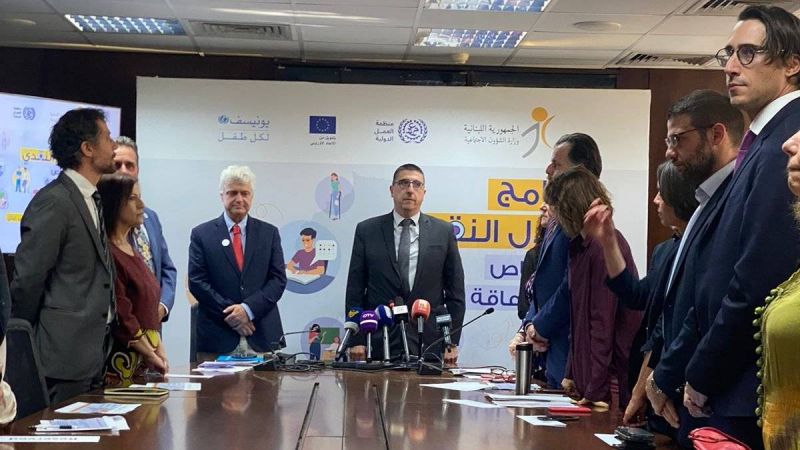
Caretaker Minister of Social Affairs Hector Hajjar (center in photo) during the launch ceremony of a program to provide benefits to people with disabilities in Lebanon. (Credit: @UNICEFLebanon / Twitter)
BEIRUT — Lebanon's Ministry of Social Affairs, in partnership with UNICEF and the International Labor Organization (ILO), announced the implementation of a National Disability Allowance (NDA) program on Wednesday.
The program, funded by the European Union, aims to provide financial support to people with disabilities living in Lebanon by covering costs related to their disabilities and facilitating access to basic services.
The ministry announced that for 12 months, more than 20,000 people will receive $40 per month. Beneficiaries must hold an official disability card issued by the Ministry of Social Affairs.
On Wednesday, 5,000 people registered with the ministry received a message explaining they could collect their first allowance through the transfer company OMT, the ministry confirmed to L'Orient Today.
During the first phase of the program, priority will be given to young people between 18 and 28 years old to help them pursue their studies or enter the labor market. The monthly allowance will eventually be made available to all ages.
UNICEF tweeted Wednesday that the NDA program will target all people living in Lebanon, regardless of their nationality.
During the launching ceremony, Outgoing Social Affairs Minister Hector Hajjar thanked all the people "who worked on this project."
Exclusion from social circles
Alessandra Viezzer, head of cooperation of the European Union delegation in Lebanon, emphasized the "experimental" aspect of the program while expressing her enthusiasm about the anticipated results.
Peter Rademaker, deputy regional director of the ILO for Arab countries, said people with disabilities are "often excluded from social circles in Lebanon," but the NDA program is "a great step forward in the expansion of social protection" in the country.
Edouard Beigbeder, UNICEF's representative in Lebanon, stressed the urgent need to "expand the scope of national social assistance for people with disabilities," especially given the ongoing economic crisis.
In December 2021, when the program was first announced, ILO Regional Director for Arab Countries Ruba Jarada pointed out that the cost of living of a person with disabilities is 35 to 40 percent higher than that of a person without disabilities.
"It is logical to judge that these people face this crisis the most violently," she said.